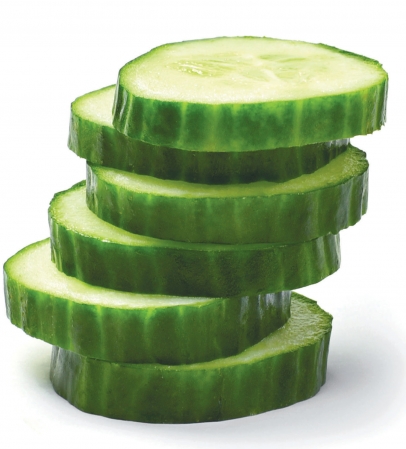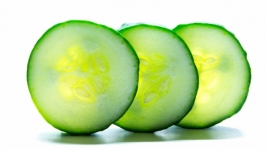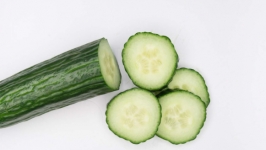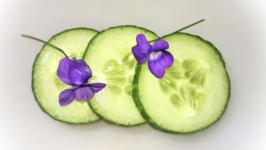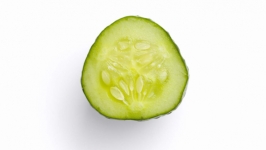Cucumbers: Summer's Crisp, Cool - and Healthy - Refresher
As the temperature rises, so does our appetite for foods that keep us cool. For such respite, nothing compares to cucumbers—a long-season vegetable that’s good for your body, inside and out.
Cucumbers are cucurbits, in the same family as winter squash, pumpkins and zucchini, and they travel by vine along the ground—a trait that requires supervision.
“Plants that grow along the ground are more exposed to moisture and therefore more susceptible to pathogens and disease,” says Sam Marlow, assistant manager at Sandbrook Meadow Farm in Stockton. “The key to healthy plants is airflow, so planting cucumbers on a straw- or mulch-covered bed is ideal,” she advises, adding that cucumber plants can grow upward if given the chance. “Using a trellis not only allows ample air flow, it makes them easier to pick, [helps them] grow straight and optimizes garden space.”
Cucumber plants can be prolific, producing all season long if conditions allow. But to keep a plant producing, one must keep picking.
“The main objectives of plants [are] to reproduce and make seeds,” explains Marlow. “If you let a cucumber continue to ripen past its prime, the plant will focus its energy on making seeds instead of more flowers, which stunts production,” she says. “More flowers mean more fruit.”
As for varieties, there are many—cucumbers can range in color from shades of green to white and gold, and there are even varieties that resemble tiny watermelons (called Mexican sour gherkins or “cucumelons”). Plus, cucumbers can also vary in texture, with either smooth or spiny skin.
“English and Japanese cucumbers have a higher density and low seed count, which makes them perfect for sandwiches, and [they] can even stand up to sautéing,” says Marlow, who recommends searing them on high heat to lock in their flavor. “Small, immature cucumbers are delicious as well,” she adds. “They are tart, citrusy and great for pickling.” Beyond their culinary uses, cucumbers benefit the body in more ways than one.
“There’s a common misconception that cucumbers don’t have nutritional value and that they’re mostly made of water—but that’s far from true,” says Stephanie Spock, clinical nutritionist at Restoration Nutrition and co-owner of Rolling Hills Farm in Lambertville.
Spock explains that, although cucumbers do contain a lot of water, they also contain high amounts of potassium, an electrolyte that helps maintain hydration levels, making them a perfect summertime snack.
“[Cucumbers are] high in caffeic acid and vitamin C, which are both powerful anti-inflammatories. It’s why people put slices on their eyes to help reduce puffiness,” she says, adding that, similar to aloe, cucumbers can be used topically for alleviating discomfort due to sunburn and even bee stings.
But the anti-inflammatory properties of these fruits aren’t just limited to external uses; they can also have internal benefits.
“Cucumbers are high in antioxidants like beta-carotene and flavonoids, which are thought to be protective against heart disease,” Spock says. “What’s more, they contain polyphenols called lignans— fiber compounds found in plants that bind to estrogen receptors in the digestive tract. This process helps regulate hormones and can protect against estrogen-related diseases like breast, ovarian and prostate cancer.”
As far as sourcing cucumbers, Spock recommends choosing local and organic.
“Avoid purchasing conventional cucumbers in grocery stores because they are often coated with synthetic wax, which your body can’t break down,” she says, noting the reason cucumbers are on the “Dirty Dozen” list, which is compiled by the Environmental Working Group to alert consumers about the pesticide risks in fruits and vegetables. “You can’t rinse off pesticides when they’re sealed in wax,” she says.
With local and organic cucumbers, it’s worth it to eat the peel. “The peel is slightly bitter, and bitter foods are good for digestion,” she says. “[Bitterness] helps stimulate your bile and gets your digestive tract moving.”
This season, stay cool knowing that cucumbers offer much more than a crisp crunch in your summer salad. Hydrating and delicious, cucumbers are full of benefits—no matter how you slice them.


